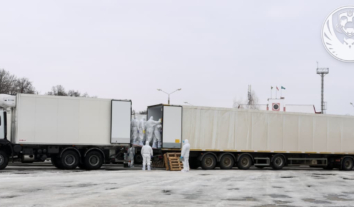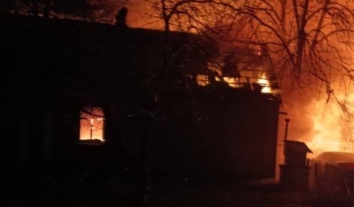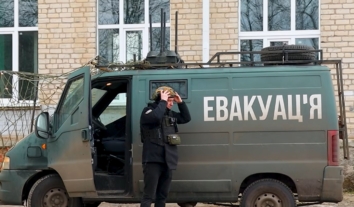Volunteer Yaroslav Zhuk stated that he was tortured in the Rostov pre-trial detention center
Yaroslav Zhuk made a statement about torture with a shocker and brutal beating by officials of the Rostov-on-Don pre-trial detention center as soon as the court hearing in his case based on trumped-up charges began in early June of this year. Zhuk is a car mechanic and a resident of Melitopol, a city in the Zaporizhzhia region occupied by Russian forces since the full-scale invasion of Ukraine.
In June 2022, he was abducted by the Russian forces after the explosion near the Industrial and Economic College of Melitopol. Zhuk later was transferred to the temporarily occupied Crimea. He was continuously beaten, tortured, and threatened to be killed in the pre-trial detention center in Simferopol until he agreed to confess to wrongdoing, based on accounts from Zhuk and his lawyer. Zhuk is accused of intending to commit an “act of international terrorism” by Russian occupying authorities for his alleged involvement in the explosion and the Ukrainian guerilla movement.
He provided a brief note with some details about torture in Rostov, according to a human rights organization Crimean Process.
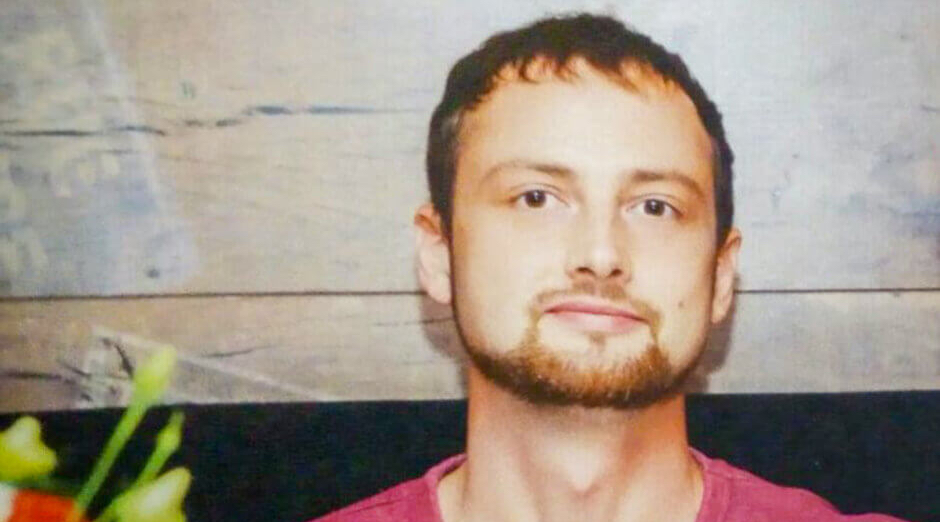 Yaroslav Zhuk
Yaroslav ZhukZhuk stated that he was beaten by three men who asked questions about Zhuk’s connections with representatives of banned organizations [in Russia].
“I have traces of beatings. They put me on the floor, poured cold water on me, beat me, and hit me with a shocker,” Yaroslav Zhuk said.
Zhuk did not see the faces of men because he was forbidden to raise his head.
Moreover, Zhuk did not receive bedclothes from officials of the pre-trial detention in Rostov. He was forced to sleep on the floor of his cell without a bed or a mattress.
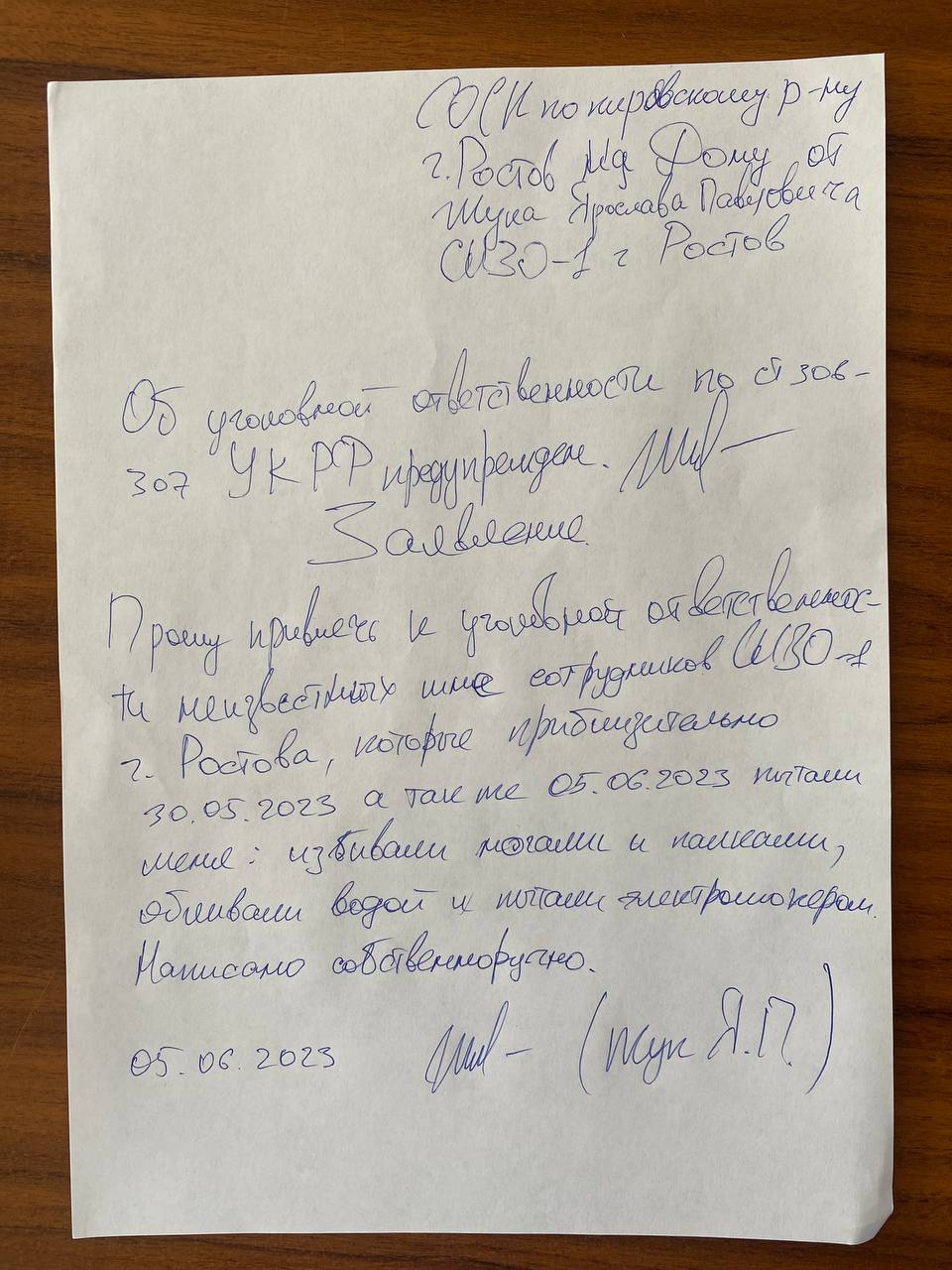 A handwritten note from Yaroslav Zhuk from June 5, 2023, with an account of torture and beating he had experienced. Photo: Crimean Process
A handwritten note from Yaroslav Zhuk from June 5, 2023, with an account of torture and beating he had experienced. Photo: Crimean ProcessZhuk’s defense asked for the issuance of a private decision by the Russian court to launch an investigation into the alleged mistreatment of Zhuk by officials of the pre-trial detention center in Rostov-on-Don based on the account in a handwritten note. The court rejected this request, stressing that the prosecutor participates in the hearing and can initiate an inspection if violations of the law are detected. Later, the defense submitted a statement about the crime to the Investigative Committee of Russia.
In addition, during the hearing in early June, the court announced an indictment in the criminal case, according to which Yaroslav Zhuk planned to commit an “act of international terrorism” by detonating two explosive devices. The defendant himself denies guilt and claims that he is a combatant and must be kept as a prisoner of war. He also emphasized that he had only one explosive device, and the second one was thrown into his car after the arrest.
On November 2022, Zhuk claimed that he had been continuously tortured by the Federal Security Service of Russia since he was kidnapped.
“About every half an hour, unknown people came and tortured me: they shocked me with electric shocks and attached wires to my legs, arms, genitals, earlobes, and nipples. They hit me with blunt objects all over my body. They set my feet on fire with a gas burner and, at the same time, abused me… Under torture, I was forced to slander myself. When I agreed, unable to bear the abuse, I was blindfolded and taken to another room, without electricity or water, where they made me sign a printed confession in a fabricated case,” the volunteer said in a statement.
Recently, ZMINA analyzed cases of torture and ill-treatment of the civilian population in Ukrainian territories that were under Russian occupation. Based on the report by human rights defenders, the Russian military perceives the entire population of the temporarily occupied territories as a threat. Ukrainians in these areas are kidnapped, interrogated, and tortured en masse. Such crimes are part of the systematic policy of suppressing any resistance in the temporarily occupied territories. In the first weeks of the full-scale invasion, incidents of brutal treatment of the population were mostly spontaneous. Often, their intensity grew against the background of the military successes of the Ukrainian army. The longer the territory was under occupation, the more systematic the abductions and torture became.
According to the Mission of the President of Ukraine in the Autonomous Republic of Crimea, at least 181 individuals are held in custody or imprisoned on the territory of the temporarily occupied Crimea or Russia.

